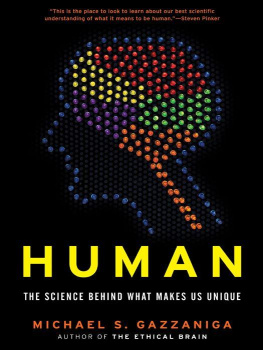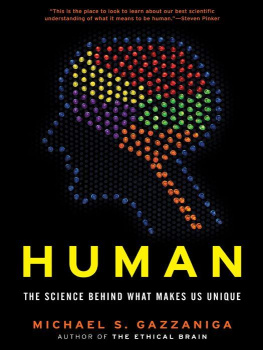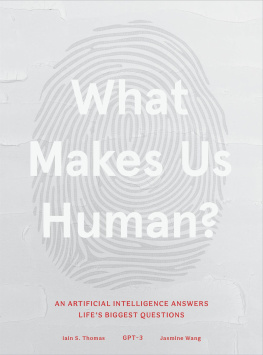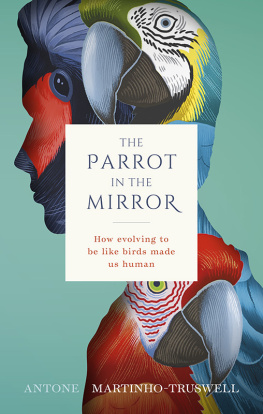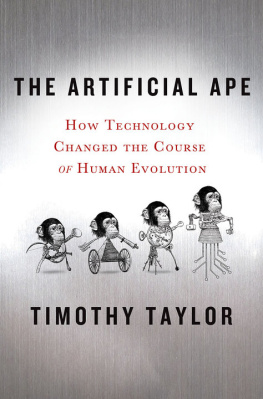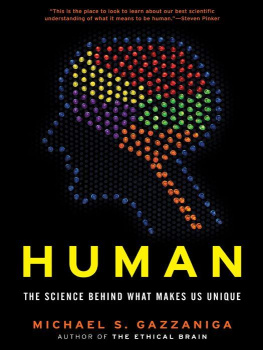Gazzaniga - Human
Here you can read online Gazzaniga - Human full text of the book (entire story) in english for free. Download pdf and epub, get meaning, cover and reviews about this ebook. year: 2009;2014, publisher: HarperCollins e-Books, genre: Romance novel. Description of the work, (preface) as well as reviews are available. Best literature library LitArk.com created for fans of good reading and offers a wide selection of genres:
Romance novel
Science fiction
Adventure
Detective
Science
History
Home and family
Prose
Art
Politics
Computer
Non-fiction
Religion
Business
Children
Humor
Choose a favorite category and find really read worthwhile books. Enjoy immersion in the world of imagination, feel the emotions of the characters or learn something new for yourself, make an fascinating discovery.
- Book:Human
- Author:
- Publisher:HarperCollins e-Books
- Genre:
- Year:2009;2014
- Rating:5 / 5
- Favourites:Add to favourites
- Your mark:
- 100
- 1
- 2
- 3
- 4
- 5
Human: summary, description and annotation
We offer to read an annotation, description, summary or preface (depends on what the author of the book "Human" wrote himself). If you haven't found the necessary information about the book — write in the comments, we will try to find it.
Human — read online for free the complete book (whole text) full work
Below is the text of the book, divided by pages. System saving the place of the last page read, allows you to conveniently read the book "Human" online for free, without having to search again every time where you left off. Put a bookmark, and you can go to the page where you finished reading at any time.
Font size:
Interval:
Bookmark:
The Science Behind What Makes Us Unique

For Rebecca Ann Gazzaniga, M.D.
the quintessential human
and everybodys favorite aunt
Part 1
The Basics of Human Life
Part 2
Navigating the Social World
Part 3
The Glory of Being Human
Part 4
Beyond Current Constraints
This book started a long time ago. Its origins are probably somewhere in the J. Alfred Prufrock house at Caltech, where I had the privilege of being in graduate school. That is what we called The House, and it had several bedrooms, one of which was mine. I can tell you the inhabitants of the other bedrooms were all much smarter and wiser than I. Most were physicists, and all went on to great careers. They thought hard about hard problems and they cracked many of them.
What was enduring about the experience for a young neophyte like me were the aspirations of these bright men. Work on the hard problems. Work, work, work. And I did, and I have. Paradoxically, the problem I have spent my life examining is much harder than theirs, which in a phrase is, what is the deal with humans? Oddly, they were fascinated with my problem, and at the same time, I couldnt get to first base with the conceptual tools they used on a moment-by-moment basis to tackle their own problems. While I used to whip my housemate, the physicist Norman Dombey, in chess, I remain to this day not at all confident that I truly understand the second law of thermodynamics. In fact, I know I dont. Yet Norman seemed to understand everything.
The atmosphere was suffused with the pervasive belief that the objective of the meaningful life is to gain insight into its mysteries. That was what was so contagious. So, here I am trying to do it again, some forty-five years later. And yet, not by myself, not by a long shot. The issue is trying to figure out what it means to be human. That is clear enough. So, to come out of the bullpen once more, I tapped into all the bright young students around me.
The journey started almost three years ago with my senior seminar during my last year at Dartmouth College. An extraordinary group of young men and women were assigned topics I knew I wanted to explore, and they all bellied up to the bar with insights and juice. We hacked away at it for two months or so, and it was all deeply illuminating. Two of the students caught the fever, and I am happy to report that they are off to careers in the science of the mind.
The following year, I taught my first class at the University of California, Santa Barbara, a university that doesnt apologize for being committed to research and scholarship. This was a class of dedicated graduate students, and they too deepened and added insights to the evolving story. Then a funny thing happened.
It was determined I had prostate cancer and needed surgery. Let me tell you, that is a bad hair day, even when you are bald! And yet I fell into terrific medical hands and came through it with a good prognosis. Still, I was swamped with work, and by luck, my sister Rebecca Gazzaniga, perhaps the finest person who ever graced this earth, was ready to try something new. She is a physician, a botanist, a painter, a chef, a traveler, and everyones favorite aunt. And now I discover she is a science junkie, a writer and editor and collaborator. A star has been born. Without her help, this book would not exist.
I have attempted to become a mouthpiece for the vast talents of many people, both students and family. I do it with pride and joy, as I still remember that special imperative of the Prufrock house at Caltech: Think about the big problems. It is not that they are grave. They are challenging, inspiring, and enduring. See what you think.
I ALWAYS SMILE WHEN I HEAR G ARRISON K EILLOR SAY , B E well, do good work, and keep in touch. It is such a simple sentiment, yet so full of human complexity. Other apes dont have that sentiment. Think about it. Our species does like to wish people well, not harm. No one ever says, Have a bad day or Do bad work, and keeping in touch is what the cell-phone industry has discovered all of us do, even when there is nothing going on.
There in one sentence Keillor captures humanness. A familiar cartoon with various captions makes its way around evolutionary biologists circles. It shows an ape at one end of a line and then several intermediate early humans culminating in a tall human standing erect at the other end. We now know that the line isnt so direct, but the metaphor still works. We did evolve, and we are what we are through the forces of natural selection. And yet I would like to amend that cartoon. I see the human turning around with a knife in his hand and cutting his imaginary tether to the earlier versions, becoming liberated to do things no other animal comes close to doing.
We humans are special. All of us solve problems effortlessly and routinely. When we approach a screen door with our arms full of bags of groceries, we instantly know how to stick out our pinky and hook it around the door handle to open it. The human mind is so generative and so given to animation that we do things such as map agency (that is, we project intent) onto almost anythingour pets, our old shoes, our cars, our world, our gods. It is as if we dont want to be alone up here at the top of the cognitive chain as the smartest things on earth. We want to see our dogs charm us and appeal to our emotions; we imagine that they too can have pity, love, hate, and all the rest. We are a big deal and we are a little scared about it.
Thousands of scientists and philosophers over hundreds of years have either recognized this uniqueness of ours or have denied it and looked for the antecedents of everything human in other animals. In recent years, clever scientists have found antecedents to all kinds of things that we had assumed were purely human constructions. We used to think that only humans had the ability to reflect on their own thoughts, which is called metacognition . Well, think again. Two psychologists at the University of Georgia have shown that rats also have this ability. It turns out that rats know what they dont know. Does that mean we should do away with our rat traps? I dont think so.
Everywhere I look I see tidbits of differences, and one can always say a particular tidbit can be found in others aspects of biological life. Ralph Greenspan, a very talented neuroscientist and geneticist at the Neuroscience Institute in La Jolla, California, studies, of all things, sleep in the fruit fly.
Someone had asked him at lunch one day, Do flies sleep? He quipped, I dont know and I dont care. But then he got to thinking about it and realized that maybe he could learn something about the mysterious process of sleep, which has eluded understanding. The short version of this story is that flies do sleep, just as we do. More important, flies express the same genes during sleeping and waking hours that we do. Indeed, Greenspans current research suggests that even protozoans sleep. Good grief!
The point is that most human activity can be related to antecedents in other animals. But to be swept away by such a fact is to miss the point of human experience. In the following chapters, we will comb through data about our brains, our minds, our social world, our feelings, our artistic endeavors, our capacity to confer agency, our consciousness, and our growing knowledge that our brain parts can be replaced with silicon parts. From this jaunt, one clear fact emerges. Although we are made up of the same chemicals, with the same physiological reactions, we are very different from other animals. Just as gases can become liquids, which can become solids, phase shifts occur in evolution, shifts so large in their implications that it becomes almost impossible to think of them as having the same components. A foggy mist is made up of the same stuff as an iceberg. In a complex relationship with the environment, very similar substances with the same chemical structure can become quite different in their reality and form.
Font size:
Interval:
Bookmark:
Similar books «Human»
Look at similar books to Human. We have selected literature similar in name and meaning in the hope of providing readers with more options to find new, interesting, not yet read works.
Discussion, reviews of the book Human and just readers' own opinions. Leave your comments, write what you think about the work, its meaning or the main characters. Specify what exactly you liked and what you didn't like, and why you think so.

